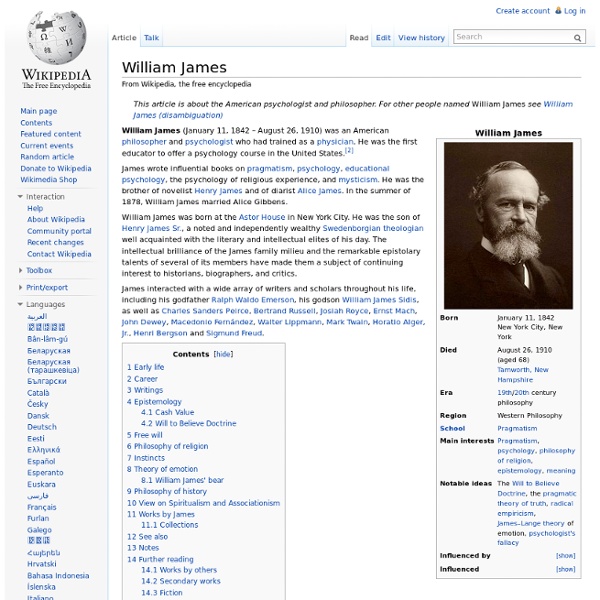Charles Sanders Peirce
Charles Sanders Peirce (/ˈpɜrs/,[9] like "purse", September 10, 1839 – April 19, 1914) was an American philosopher, logician, mathematician, and scientist, sometimes known as "the father of pragmatism". He was educated as a chemist and employed as a scientist for 30 years. Today he is appreciated largely for his contributions to logic, mathematics, philosophy, scientific methodology, and semiotics, and for his founding of pragmatism. An innovator in mathematics, statistics, philosophy, research methodology, and various sciences, Peirce considered himself, first and foremost, a logician. He made major contributions to logic, but logic for him encompassed much of that which is now called epistemology and philosophy of science. He saw logic as the formal branch of semiotics, of which he is a founder. Life[edit] Peirce's birthplace. Peirce suffered from his late teens onward from a nervous condition then known as "facial neuralgia", which would today be diagnosed as trigeminal neuralgia.
George Herbert Mead
George Herbert Mead (1863–1931) was an American philosopher, sociologist and psychologist, primarily affiliated with the University of Chicago, where he was one of several distinguished pragmatists. He is regarded as one of the founders of social psychology and the American sociological tradition in general. Biography[edit] Mead was born February 27, 1863 in South Hadley, Massachusetts. He was raised in a Protestant, middle-class family comprising his father, Hiram Mead, his mother, Elizabeth Storrs (Billings) Mead, and his sister Alice. His father was a former Congregationalist pastor from a lineage of farmers and clergymen and who later held the chair in Sacred Rhetoric and Pastoral Theology at Oberlin College’s theological seminary. In autumn 1887, Mead enrolled at Harvard University, where his main interests were philosophy and psychology. Writings[edit] In his lifetime,Mead published about 100 scholarly articles, reviews, and incidental pieces. Social philosophy (behaviorism)[edit]
Hubert Dreyfus
Hubert Lederer Dreyfus (born October 15, 1929) is an American philosopher and professor of philosophy at the University of California, Berkeley. Dreyfus is featured in Tao Ruspoli's film Being in the World. He was elected a Fellow of the American Academy of Arts and Sciences in 2001 and is a recipient of the Harbison Prize for Outstanding Teaching at UC Berkeley.[2] Erasmus University awarded Dreyfus an honorary doctorate "for his brilliant and highly influential work in the field of artificial intelligence, and for his equally outstanding contributions to the analysis and interpretation of twentieth century continental philosophy".[3][4] Background[edit] In 1965, while teaching at Massachusetts Institute of Technology, Dreyfus published "Alchemy and Artificial Intelligence", an attack on the work of Allen Newell and Herbert A. Simon, two of the leading researchers in the field of Artificial Intelligence. Dreyfus's criticism of AI[edit] But it is this key assumption that Dreyfus denies.
Jürgen Habermas
Biography[edit] Habermas was born in Düsseldorf, Rhine Province, in 1929. He was born with a cleft palate and had corrective surgery twice during childhood.[4] Habermas argues that his speech disability made him think differently about the importance of communication and prefer writing over the spoken word as a medium.[5] From 1956 on, he studied philosophy and sociology under the critical theorists Max Horkheimer and Theodor Adorno at the Goethe University Frankfurt's Institute for Social Research, but because of a rift between the two over his dissertation—Horkheimer had made unacceptable demands for revision—as well as his own belief that the Frankfurt School had become paralyzed with political skepticism and disdain for modern culture[6]—he finished his habilitation in political science at the University of Marburg under the Marxist Wolfgang Abendroth. Habermas then returned to his chair at Frankfurt and the directorship of the Institute for Social Research. Teacher and mentor[edit]



